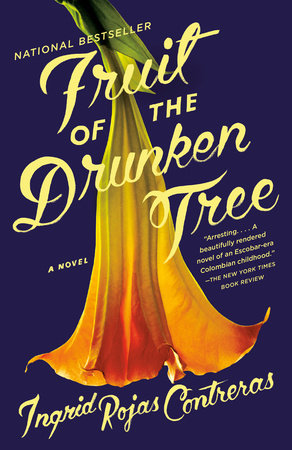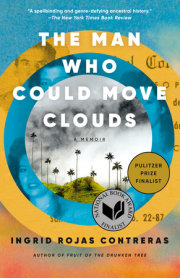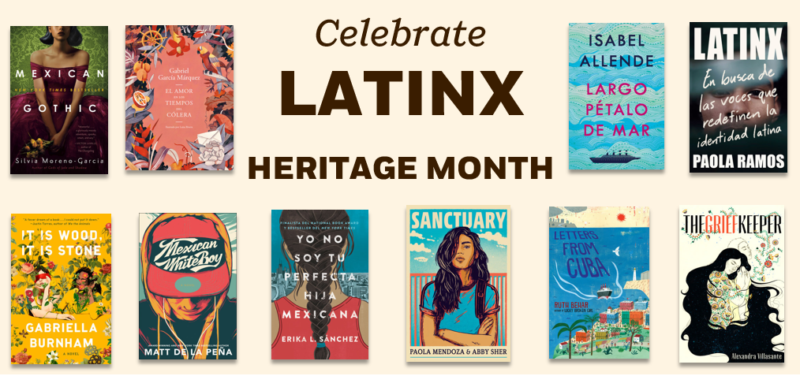1. The Photograph
She sits in a plastic chair in front of a brick wall, slouching. She is meek with her hair parted down the middle. There are almost no lips to be seen, but by the way she bares her teeth you can tell she is smiling. At first the smile seems flat but the more I study it, the more it seems careless and irresponsible. There is a bundle in her arms and a hole for the newborn’s face, which comes out red and wrinkled like an old person’s. I know it’s a boy because of the blue ribbon woven into the blanket edge; then I stare at the man behind Petrona. He is afroed and striking, weighing his cursed hand on her shoulder. I know what he’s done, and it turns my stomach but who am I to say whom Petrona should allow into a family portrait such as this?
On the back there’s a date stamp of when the photo was printed--and because when I count back nine months it falls exactly on the month my family and I fled from Colombia and arrived in L.A., I turn back the photograph to look intently at the baby, to register every wrinkle and bulge around the dark hole of his gaping mouth, to decide whether he is crying or laughing, because I know exactly where and how he was conceived and that’s how I lose track of time, thinking it was my fault that the girl Petrona was just fifteen when her belly was filled with bones, and when Mama comes back from work, she does not yell (even though she sees the photograph, the envelope, the letter from Petrona all addressed to me)--no, Mama sits down next to me like taking off so much weight, and together we are quiet and sorry on our dirty stoop on Via Corona in East L.A., staring at that fucking photograph.
We were refugees when we arrived to the U.S. You must be happy now that you’re safe, people said. They told us to strive for assimilation. The quicker we transformed into one of the many the better. But how could we choose? The U.S. was the land that saved us; Colombia was the land that saw us emerge.
There were mathematical principles to becoming an American: you had to know one hundred historical facts (What was one reason for the Civil War? Who was the president during World War II?), and you had to spend five uninterrupted years on North American soil. We memorized the facts, we stayed in place--but when I elevated my feet at night and my head found its pillow I wondered: of what country was I during those hours when my feet were in the air
When we applied for citizenship, I rounded the hard edges of my accent and that was one tangible way in which I had changed. We heard nothing for a year. We grew thin. We understood how little we were worth, how small our claim in the world. We had no money after our application fee, and nowhere to go. Then, we received the summons for our interview, the final background check, the examination, the approval.
At the ceremony, they screened a video filled with eagles and artillery and all of us recited a pledge. We sang our new anthem and once it was done it was said we were American. The newest batch of Americans celebrated, but in the open courtyard, I let my head hang back. I watched the sway of palm trees knowing here was where I was supposed to think about the future, and how bright it might be, but instead all I could think of was Petrona, how I was fifteen like she had been the last time I saw her.
From Mama’s old agenda I got her address. But it wasn’t a real address, just a set of directions Petrona had dictated to Mama back when we lived in Bogota: Petrona Sanchez at the invasion between Street 7 and 48. Kilometer 56, the house past the lilac bush. In our apartment, I locked myself in the bathroom and turned on the shower, and as the bathroom steamed I wrote the letter. I didn’t know where to begin, so I followed the form I had learned in middle school:
Heading (3 de Febrero del 2000, Chula Santiago, Los Angeles, Estados Unidos), respectful greeting (Querida Petrona), body that uses easy and exact vocabulary (Petrona, como estas? Como esta tu familia?), each new paragraph with first line indented (Mi familia esta bien. / Estoy leyendo Don Quixote. / Los Angeles es bonita, pero no tan bonita como Bogota). The closing line was next, but instead I wrote about what it was like to flee from Colombia; how we boarded a plane, Bogota to Miami to Houston to L.A., how I prayed for no immigration officers to stop us and send us back, how I could not stop thinking about everything we had lost. When we first arrived to L.A. it was impossibly sunny and all I could smell was the salt from the ocean. The smell of salt burned my nose when I breathed in. I wrote paragraph after paragraph about salt, like I was crazy (We washed our hands with salt to reverse bad luck. / Salt was the one thing Mama bought when she was afraid to spend our money. / I read in a magazine that packaged salt has crushed animal bone in it, which disgusted me until I realized that so must the ocean’s. Beach sand was part bones too). In the end all the talk about salt came to feel like some type of code. It’s gotten so, I wrote, I can’t even smell salt anymore. It became my closing line, not because I meant it to be but because suddenly I had nothing more to say.
I never asked the one thing I wanted to know: Petrona, when we left, where did you go?
When Petrona’s reply arrived, I tried to find hidden messages behind the ordinary information she volunteered: the nice weather, the newly paved road to her house in the invasion, the lettuces, the cabbages in season.
In the end it didn’t matter her letter back to me was so ordinary, because all the answers I could ever hunger for were printed on that photograph, which she creased in half and placed in the folds of her letter before licking the envelope and pressing it shut, before handing the letter to the postman, before it traveled just like how I once did, Bogota to Miami to Houston to L.A., before it arrived bringing with it all this wreckage to our doorstep.
2. The Girl Petrona
The girl Petrona came to our home when I was seven and my sister Cassandra was nine. She was thirteen and had only gone through the third grade. She stood with a tattered brown suitcase at the gate of our three-story house in a yellow dress that dangled at her ankles. Her hair was short and her mouth was hanging open.
The garden yawned between us like an abyss. Cassandra and I gazed at the girl Petrona from behind the two left-most columns of our house. The white columns rose from the porch and supported the overhang of the second floor. The second floor stuck out like an overbite. It was a typical Bogotá house, made to look like the old colonials, white with wide windows and black iron bars and a clay roof with red-blue half-moon tiles. It was part of a row of identical houses linked one to the other by the sidewalls. I didn’t know then why the girl Petrona looked at our house that way, but Cassandra and I gaped back at her with the same kind of awe. The girl Petrona lived in an invasion. There were invasiones in almost every tall hill in the city, government land taken over by the displaced and the poor. Mama herself had grown up in an invasion--but not in Bogotá.
From behind her column Cassandra asked, “Did you see what she’s wearing, Chula? That’s a boy haircut she has.” She widened her eyes behind her glasses. Cassandra’s glasses took up a great deal of her face. They were pink-rimmed and oversized and magnified the pores on her cheeks. Mama was waving at the girl Petrona from the front door. She sprang forward into the garden, clicking her heels on the stepping-stones and bouncing her hair on her back.
The girl Petrona watched Mama as she approached.
Mama was a natural beauty. That’s what other people said. Strange men on the street stopped her in order to pay compliments to the dramatic breadth of her eyebrows or the pull of her deep, brown eyes. Mama didn’t like going through pains for her beauty, but she woke up every morning to apply thick black liner to her eyes, and drove monthly to the salon to get her toenails done, arguing all the while that it was worth it, because her eyes were the well of her power and her small feet the mark of her innocence.
The night before the girl Petrona arrived Mama made three stacks with her tarot cards on her breakfast table and asked, “Is the girl Petrona trustworthy?” She put the question in a number of ways with a variety of tones until she felt she was asking the question with one mind; then she picked the top card from the middle stack. She flipped the card over and laid it in front of her and saw that it was the Fool. Her hand froze in midair as she regarded the upside-down card. The card depicted a white man smiling caught in a half step looking dreamily to the sky, in one hand a white rose and over his shoulder a golden satchel. He wore leggings and boots and a princelike flouncy dress. At his feet a white dog leaped. The man wasn’t looking, but he was about to fall off a cliff.
Mama collected the stacks in her hands, reshuffling: “Well, we’ve been warned.”
“Should we tell Papa?” I asked. Papa worked at an oil site far away in Sincelejo and I was never sure when he was due back for a visit. Mama said Papa had to work far away because there were no jobs in Bogotá, but all I knew was that sometimes we told Papa about things, and sometimes we didn’t.
Mama laughed. “It’s all the same anyway. Any girl you hire in this city will have ties to hooligans. Just look at Dolores down the block--her girl was part of a gang and they robbed Dolores’s house, imagine: they didn’t even leave the microwave.” Mama saw the worry on my face. Her eyeliner ran thickly and ticked up at the corners. The tick wrinkled as she smiled. She dug her finger in my ribs. “You’re too serious. Don’t worry.”
In the front garden Cassandra said from behind her column, “This girl Petrona won’t last a month--look at her; she has the spirit of a mosquito.” I blinked and saw that it was true. The girl Petrona shrank back as Mama opened the gate.
Mama always had bad luck with girls. The last girl, Julieta, was fired because Mama had walked into the kitchen at the wrong time and saw Julieta form her mouth around a drop of spit, and as the girl Julieta looked up the spit plunged into Mama’s morning coffee. When Mama demanded an explanation, the girl Julieta said, “Maybe the Senora’s eyes are seeing things.” A second later Mama was throwing the girl Julieta’s belongings on the street, and grabbing the girl Julieta by the collar saying, “Don’t come back, Julieta, don’t you bother coming back,” pushing her out of the door and slamming it shut.
Mama hired girls based on the urgency of their situation. She sought out girls employed at other houses and gave them our telephone number in case somebody they knew needed a job. Mama heard sad stories of families struck by illness, pregnancy, displaced by war, and even though we could only offer five thousand pesos per day, enough for some vegetables and rice at the market, many girls were interested in applying. I think Mama was always hiring girls that reminded her of herself in her youth, but it never turned out how she wanted.
One girl had almost stolen Cassandra when she was a baby. Mama didn’t know her name, only that she was infertile--except how Mama put it was that the girl was barren like beach sand in a drought. Most people we knew got kidnapped in the routine way: at the hands of guerrillas, held at ransom and then returned, or disappeared. The way Cassandra almost got kidnapped was a fun twist on an all too common story. There was a photograph of the infertile girl in question in our family album. She looked out from behind the slick of the plastic sheet with frizzy hair and a missing front tooth. Mama said she kept the girl’s photo in our album because it was all part of our family history. Even the photos of Papa as a communist youth were there for anyone to see. He wore bell-bottom jeans and dark sunglasses. His teeth were clenched and his fist was in the air. He looked sophisticated, but Mama said not to be fooled, because really Papa was as lost as Adam from the Bible would be on Mother’s Day.
Ours was a kingdom of women, with Mama at the head, perpetually trying to find a fourth like us, or a fourth like her, a younger version of Mama, poor and eager to climb out of poverty, on whom Mama could right the wrongs she herself had endured.
At the gate, Mama extended her hand firmly to the girl Petrona. The girl Petrona was slow so Mama scooped her hand in both of hers and moved it rigidly up and down. The girl Petrona’s arm undulated free and loose like a wave. “How do you do?” Mama said. The girl Petrona merely assented and locked her eyes on to the ground. Cassandra was right. This girl Petrona would not last a month. Mama put an arm around the girl Petrona and led her into our garden, except instead of going up the stone steps to our front door they veered to the left. Together they walked toward the bed of flowers at the edge of the garden. They stopped in front of the tree closest to the gate and then Mama pointed at the tree and whispered.
We called it el Borrachero, the Drunken Tree. Papa called it by its scientific name, Brugmansia arborea alba, but nobody ever knew what he was talking about. It was a tall tree with twisted limbs, big white flowers, and dark brown fruits. All of the tree, even the leaves, was filled with poison. The tree drooped half over our garden, half over the neighborhood sidewalk, releasing a honeyed scent like a seductive, expensive perfume.
Copyright © 2018 by Ingrid Rojas Contreras. All rights reserved. No part of this excerpt may be reproduced or reprinted without permission in writing from the publisher.







